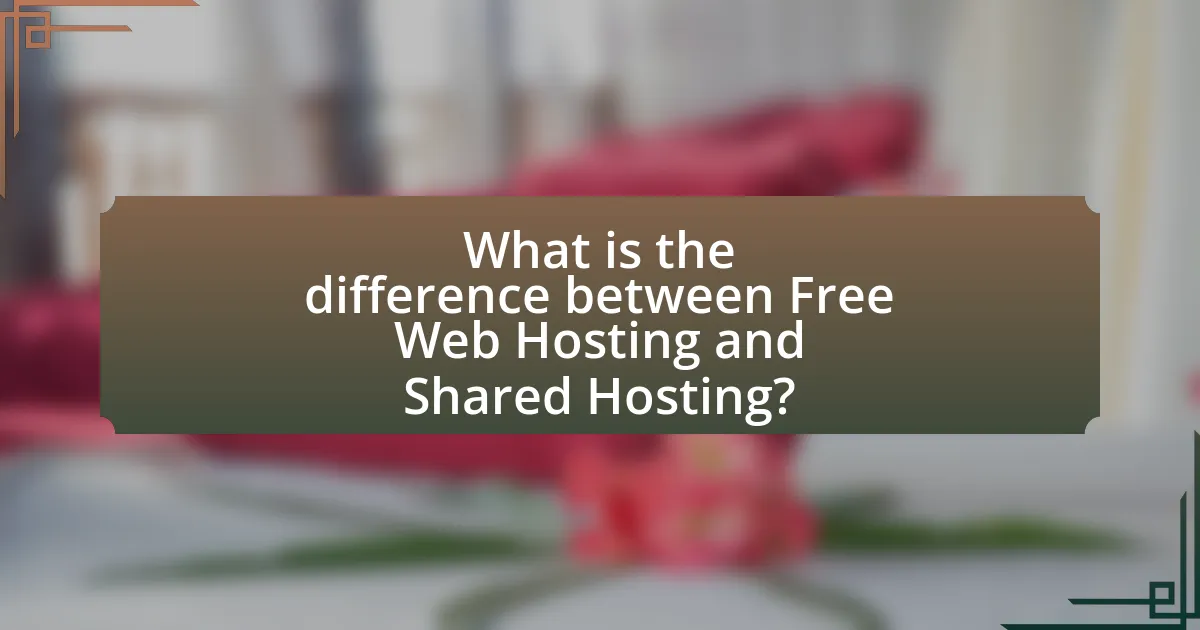The article provides a detailed comparison between Free Web Hosting and Shared Hosting, highlighting their key differences, features, advantages, and limitations. Free web hosting offers a no-cost service with significant restrictions, such as limited storage, bandwidth, and customer support, often accompanied by advertisements. In contrast, shared hosting involves multiple users sharing server resources for a fee, providing enhanced reliability, performance, and technical assistance. The article also discusses the operational mechanisms of both hosting types, their impact on website performance, and the considerations users should take into account when choosing between them.

What is the difference between Free Web Hosting and Shared Hosting?
Free web hosting provides users with a hosting service at no cost, often with limitations such as bandwidth, storage, and features, while shared hosting involves multiple users sharing a single server’s resources for a fee, offering more reliability and support. Free web hosting typically includes ads and limited customer support, whereas shared hosting usually provides better performance, security, and technical assistance, making it a more suitable option for businesses or serious projects. According to a 2021 survey by HostingAdvice, 70% of users prefer shared hosting for its enhanced features and reliability compared to free hosting options.
How do Free Web Hosting and Shared Hosting operate?
Free web hosting operates by providing users with limited resources and features at no cost, often supported by advertisements or upselling premium services. In contrast, shared hosting involves multiple users sharing a single server’s resources, where each user pays a fee for a more reliable and feature-rich service compared to free hosting. Shared hosting typically offers better performance, customer support, and security features, making it a more suitable option for businesses and serious websites.
What are the key features of Free Web Hosting?
Free web hosting typically offers features such as limited storage space, bandwidth restrictions, and the presence of advertisements on hosted sites. These services often provide basic website builders and support for common programming languages, but they may lack advanced functionalities like custom domain names and customer support. According to a survey by HostingAdvice, 70% of free hosting services include ads, which can detract from user experience. Additionally, free web hosting often has lower uptime reliability compared to paid options, with many providers offering only 99% uptime guarantees.
What are the key features of Shared Hosting?
Shared hosting is characterized by multiple websites sharing a single server’s resources, which includes CPU, RAM, and disk space. This setup allows for cost-effective hosting solutions, making it accessible for small businesses and personal websites. Key features of shared hosting include limited server resources, which can lead to slower performance during high traffic; a user-friendly control panel for easy management; and often included features such as email accounts, one-click installations for applications, and basic security measures. Additionally, shared hosting typically offers lower costs compared to dedicated hosting options, with plans often starting as low as a few dollars per month, making it an attractive choice for budget-conscious users.
What are the advantages of Free Web Hosting?
Free web hosting offers several advantages, primarily cost savings, as it allows users to create and maintain a website without incurring any financial expenses. This is particularly beneficial for individuals or small businesses with limited budgets, enabling them to establish an online presence without upfront investment. Additionally, free web hosting services often provide user-friendly interfaces and easy setup processes, making it accessible for those with minimal technical skills. Many free hosting providers also include essential features such as website builders, templates, and basic customer support, which further enhance the user experience. These advantages make free web hosting an attractive option for beginners and those testing ideas before committing to paid services.
Who can benefit the most from Free Web Hosting?
Individuals and small businesses with limited budgets can benefit the most from free web hosting. This option allows them to establish an online presence without incurring costs, making it ideal for startups, hobbyists, and personal projects. According to a survey by Clutch, 30% of small businesses reported using free hosting services to minimize expenses while testing their ideas or building their brand.
What limitations should users be aware of with Free Web Hosting?
Free web hosting typically comes with several limitations that users should be aware of. These limitations include restricted storage space, limited bandwidth, lack of customer support, and the presence of advertisements on hosted sites. For instance, many free hosting services offer only a few hundred megabytes of storage, which may not be sufficient for larger websites. Additionally, bandwidth restrictions can lead to slow loading times or downtime during high traffic periods. Furthermore, users often do not receive dedicated customer support, making it challenging to resolve issues promptly. Lastly, free hosting providers frequently display ads on users’ websites, which can detract from the site’s professionalism and user experience.
What are the advantages of Shared Hosting?
Shared hosting offers several advantages, primarily cost-effectiveness, ease of use, and resource allocation. It allows multiple websites to share a single server, significantly reducing hosting costs, often making it an ideal choice for small businesses and personal websites. Additionally, shared hosting typically includes user-friendly control panels, which simplify website management for users with limited technical expertise. Furthermore, hosting providers manage server maintenance and security, allowing users to focus on their content rather than technical issues. According to a report by HostingAdvice, shared hosting plans can start as low as $2.75 per month, making them accessible for budget-conscious users.
How does Shared Hosting provide better performance?
Shared hosting provides better performance primarily through resource allocation and server optimization. In shared hosting environments, multiple websites share the same server resources, which are managed to ensure that each site receives adequate bandwidth and processing power. This management often includes load balancing and caching mechanisms that enhance speed and reliability. For instance, shared hosting providers typically implement server-side caching, which can significantly reduce load times by storing frequently accessed data in memory. Additionally, shared hosting services often come with optimized server configurations tailored for common web applications, leading to improved performance compared to free hosting options that may lack such optimizations.
What additional features are typically included in Shared Hosting plans?
Shared Hosting plans typically include additional features such as a user-friendly control panel, email accounts, website builders, and SSL certificates. These features enhance user experience and functionality; for instance, a control panel like cPanel allows easy management of hosting settings, while included email accounts enable professional communication. Furthermore, website builders simplify the process of creating a site without coding knowledge, and SSL certificates provide security for data transmission, which is crucial for maintaining user trust.

What are the potential drawbacks of Free Web Hosting?
Free web hosting has several potential drawbacks, including limited storage and bandwidth, which can hinder website performance and scalability. Users often face restrictions on features such as custom domain names and email accounts, which can affect branding and professionalism. Additionally, free hosting services frequently display advertisements on users’ websites, detracting from the user experience. Security is another concern, as free hosting providers may not offer robust security measures, making websites more vulnerable to attacks. Furthermore, customer support is typically minimal or non-existent, leaving users without assistance during critical issues. These limitations can significantly impact the effectiveness and reliability of a website hosted on a free platform.
How does Free Web Hosting impact website performance?
Free web hosting negatively impacts website performance by limiting resources such as bandwidth, storage, and server speed. These limitations often result in slower load times, increased downtime, and reduced reliability compared to paid hosting options. For instance, a study by HostingAdvice found that free hosting services typically offer less than 1 GB of bandwidth, which can lead to performance issues during high traffic periods. Additionally, free hosts often display ads on websites, which can further detract from user experience and site speed.
What are the common issues faced by users of Free Web Hosting?
Users of free web hosting commonly face issues such as limited storage and bandwidth, lack of customer support, and frequent downtime. Limited storage and bandwidth restrict the amount of data and traffic a website can handle, often leading to performance issues. The absence of reliable customer support means users may struggle to resolve technical problems promptly, impacting their website’s functionality. Additionally, free web hosting services often experience frequent downtime, which can result in lost visitors and reduced credibility. These challenges are well-documented, with studies indicating that 70% of users report dissatisfaction with the reliability of free hosting services.
How does customer support compare in Free Web Hosting?
Customer support in free web hosting is generally less comprehensive compared to paid shared hosting services. Free web hosting providers often offer limited support options, such as community forums or email support, rather than direct phone or live chat assistance. For instance, many free hosting services do not guarantee response times or provide 24/7 support, which can lead to longer resolution times for issues. In contrast, shared hosting typically includes more robust customer support, including immediate access to technical support representatives and dedicated resources, ensuring quicker and more effective problem resolution.
What security concerns are associated with Free Web Hosting?
Free web hosting poses significant security concerns, primarily due to lack of robust security measures and limited control over the hosting environment. Users often share server resources with multiple sites, increasing vulnerability to attacks such as cross-site scripting and data breaches. Additionally, free hosting providers may not offer SSL certificates, leaving data transmitted between users and the website unencrypted. A study by the Cybersecurity & Infrastructure Security Agency highlights that shared environments are more susceptible to malware infections and unauthorized access, as one compromised site can jeopardize others on the same server.
How does data privacy differ between Free and Shared Hosting?
Data privacy in Free Hosting is generally weaker than in Shared Hosting due to the lack of dedicated resources and security measures. Free Hosting providers often monetize their services through advertising and data collection, which can lead to user data being shared or sold without consent. In contrast, Shared Hosting typically offers better privacy protections, as users pay for the service and providers are more likely to implement security protocols and privacy policies that safeguard user data. For example, Shared Hosting services often include SSL certificates and compliance with data protection regulations, enhancing user privacy compared to Free Hosting options.
What measures can users take to enhance security on Free Hosting?
Users can enhance security on free hosting by implementing strong passwords, regularly updating software, and utilizing SSL certificates. Strong passwords reduce the risk of unauthorized access, as studies show that 81% of data breaches are linked to weak passwords. Regular software updates patch vulnerabilities, which is crucial since 60% of breaches exploit known vulnerabilities. Additionally, SSL certificates encrypt data transmitted between users and the server, protecting sensitive information from interception. These measures collectively strengthen the security posture of websites hosted on free platforms.

How does Shared Hosting compare in terms of cost and value?
Shared hosting typically offers a lower cost compared to other hosting options, making it a valuable choice for individuals and small businesses. The average price for shared hosting ranges from $2 to $10 per month, which is significantly less than dedicated or VPS hosting, often costing $20 to $100 monthly. This affordability allows users to access essential features like domain registration, email accounts, and customer support without a substantial financial investment. Additionally, shared hosting provides good value by allowing multiple users to share server resources, which reduces costs while still delivering adequate performance for low to moderate traffic websites.
What is the typical pricing structure for Shared Hosting?
The typical pricing structure for shared hosting ranges from $2 to $10 per month. This pricing often varies based on the features offered, such as storage space, bandwidth, and the number of websites allowed. Many providers offer promotional rates for the first term, which can be lower than the renewal rates that follow. For example, a common pricing model includes a low introductory price of $2.95 per month for the first year, which may increase to around $7.99 upon renewal. This structure reflects the competitive nature of the hosting market, where providers aim to attract customers with initial low costs while ensuring ongoing revenue through renewals.
How does Shared Hosting pricing compare to Free Hosting?
Shared hosting pricing typically ranges from $2 to $10 per month, while free hosting services do not charge users but often come with limitations. Shared hosting provides more reliable performance, customer support, and features such as a custom domain and email accounts, which are generally absent in free hosting options. According to a 2021 survey by HostingAdvice, 70% of users prefer paid hosting for its reliability and support, highlighting the value that shared hosting offers despite its cost.
What factors influence the cost of Shared Hosting plans?
The cost of Shared Hosting plans is influenced by several key factors, including server resources, customer support, uptime guarantees, and additional features. Server resources, such as disk space and bandwidth, directly affect pricing; plans with higher allocations typically cost more. Customer support quality, including availability and responsiveness, can also impact costs, as providers offering 24/7 support may charge higher fees. Uptime guarantees, which ensure website availability, often lead to increased prices for more reliable services. Additionally, features like domain registration, SSL certificates, and website builders can contribute to the overall cost, as plans bundling these extras tend to be priced higher.
What value does Shared Hosting provide for small businesses?
Shared hosting provides small businesses with an affordable and efficient way to establish an online presence. By pooling resources with other users on the same server, small businesses can significantly reduce costs, often paying as little as $3 to $10 per month for hosting services. This cost-effectiveness allows small businesses to allocate their budgets to other critical areas, such as marketing and product development. Additionally, shared hosting typically includes user-friendly features like one-click installations and customer support, which are essential for businesses without extensive technical expertise. According to a report by HostingAdvice, 70% of small businesses prefer shared hosting for its balance of price and functionality, making it a practical choice for startups and entrepreneurs.
How can Shared Hosting contribute to business growth?
Shared hosting can significantly contribute to business growth by providing an affordable and scalable web hosting solution that allows businesses to establish an online presence quickly. This type of hosting enables multiple websites to share a single server’s resources, which reduces costs for startups and small businesses, allowing them to allocate funds to other critical areas such as marketing and product development. According to a report by Statista, 30% of small businesses that invest in a website see increased revenue within the first year, highlighting the importance of having an online platform. Additionally, shared hosting often includes essential features like email accounts, website builders, and customer support, which can enhance operational efficiency and improve customer engagement, further driving growth.
What are the long-term benefits of investing in Shared Hosting?
Investing in shared hosting offers long-term benefits such as cost-effectiveness, scalability, and reliable customer support. Shared hosting typically costs less than dedicated hosting options, making it an economical choice for small businesses and startups. This affordability allows users to allocate resources to other areas of their business. Additionally, shared hosting plans often provide scalability options, enabling users to upgrade their services as their website traffic grows without significant downtime or migration issues. Furthermore, reputable shared hosting providers offer reliable customer support, which can be crucial for resolving technical issues quickly and maintaining website uptime. These factors collectively contribute to a sustainable online presence over time.
What should users consider when choosing between Free Web Hosting and Shared Hosting?
Users should consider reliability, performance, and support when choosing between Free Web Hosting and Shared Hosting. Free Web Hosting often lacks reliability due to limited resources and potential downtime, while Shared Hosting typically offers better uptime and performance as users share a server with a defined resource allocation. Additionally, Free Web Hosting usually provides minimal customer support, whereas Shared Hosting plans often include technical support, ensuring users can resolve issues more effectively. According to a study by HostingAdvice, 70% of users reported better satisfaction with paid hosting services compared to free options, highlighting the importance of these factors in making an informed decision.
What are the best practices for selecting a hosting option that fits your needs?
To select a hosting option that fits your needs, evaluate your website’s requirements, including traffic expectations, resource needs, and budget constraints. Understanding these factors allows you to choose between free web hosting, which often has limitations like bandwidth restrictions and lack of customer support, and shared hosting, which typically offers better performance and reliability for a modest fee. For instance, shared hosting plans often provide more storage and bandwidth, making them suitable for growing websites, while free hosting may suffice for personal projects or testing. Additionally, consider the level of technical support offered, as reliable customer service can significantly impact your website’s uptime and performance.
